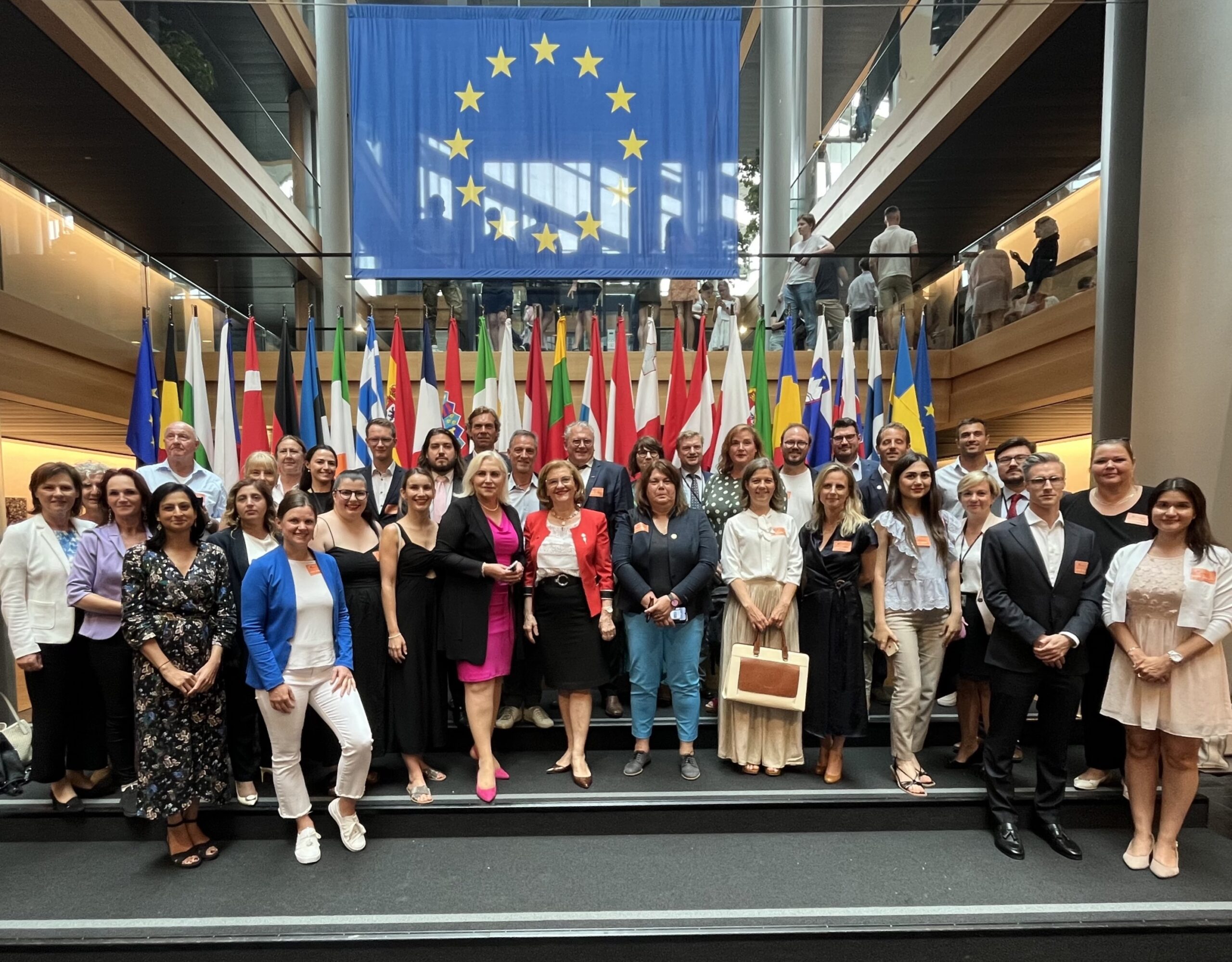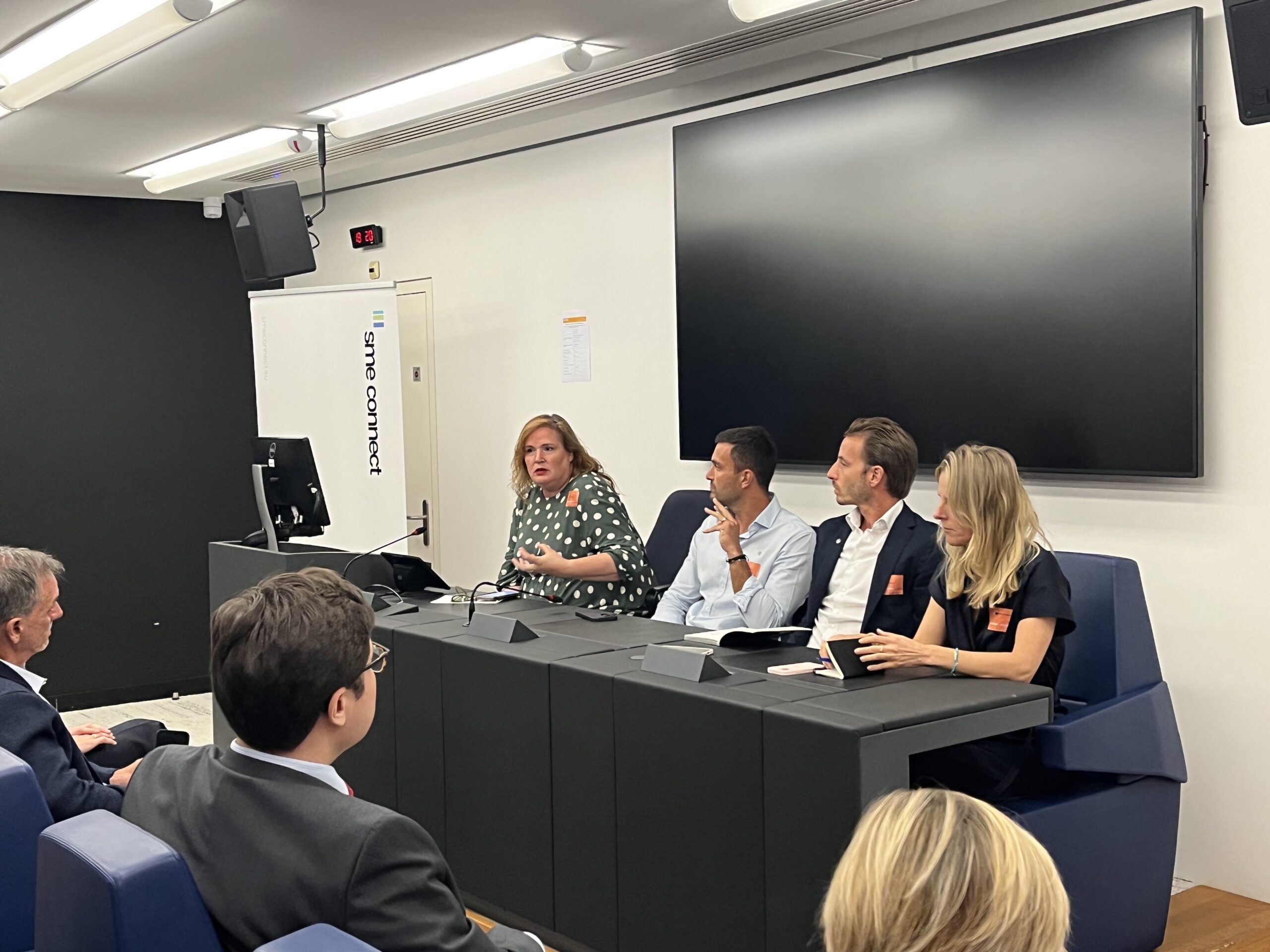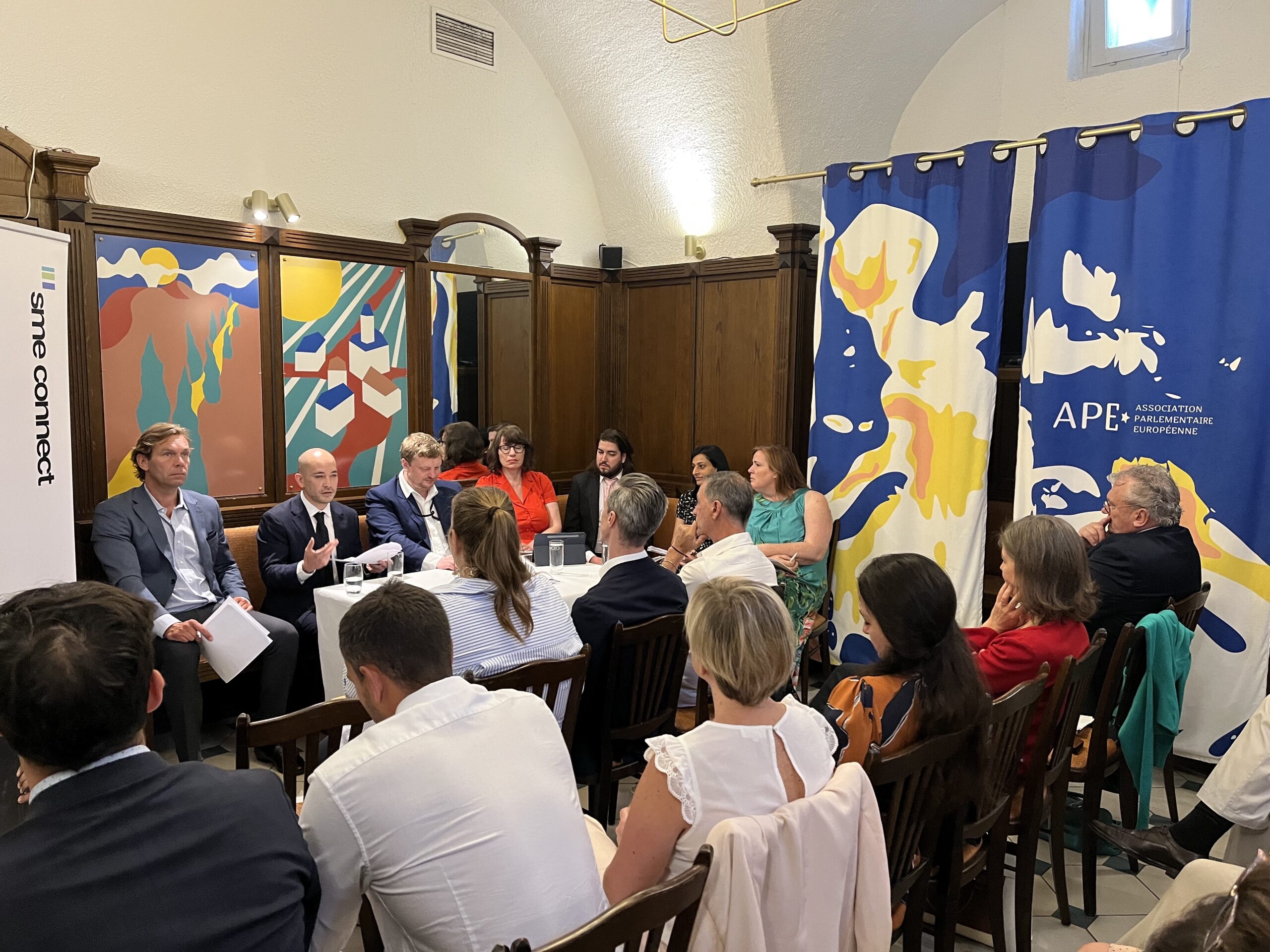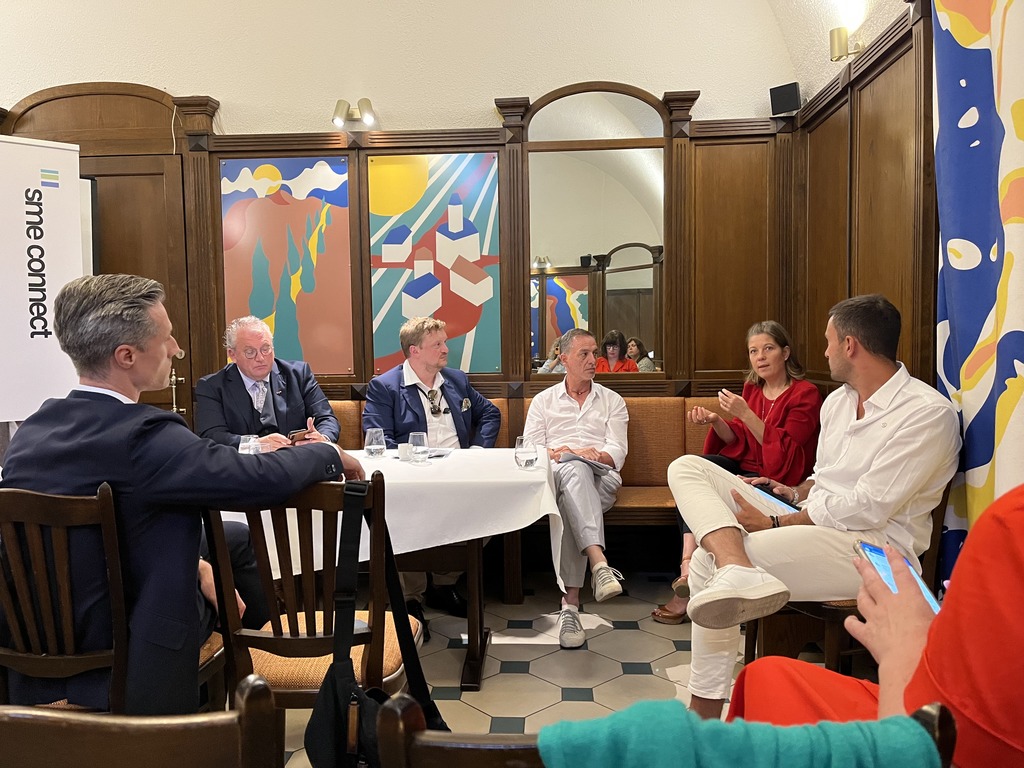The European Year of Skills:
Summit on Entrepreneurship, One-Person Companies, Self-Employment and Future of Work

On 12-13 July, 2023 SME Connect, in partnership with SME Europe, organised a 2-day study trip to Strasbourg dedicated to One-Person Company owners as well as experts in the field. Our delegation was hosted by ANGELIKA WINZIG MEP and MARIA GRAPINI MEP, co-chairs of the SME Connect Working Group on “Entrepreneurship and Self-Employment”, with the objective to learn more about the reality of entrepreneurship in Europe for OPC and SE entrepreneurs, promote the European Year of Skills and debate on how to address skills shortage in the EU.
Following the welcome of MEPs Angelika Winzig and Maria Grapini, our 1st panel explored the subject of life-long learning entrepreneurship and what could be the contribution of business, politics and society to make the “culture” of lifelong learning possible, with the participation of ELIN MCCALLUM, Director and Co-Founder of Bantani Education – The EntreComp Community; MATHIEU POULAT, Entrepreneur and Herbalife Distributor; BENOIT HAECKER, Herbalife Country Director for France and Belgium; KATARINA KAKALIKOVA, Vice President Public Policy Central Europe with Mastercard.

ELIN MCCALLUM explains the importance of entrepreneurian skills across the education from early years through adult learning and stresses how important it is to bring the real world into learning. She particularly emphasizes the importance of a safe space to practice ideas and being able to make mistakes in order to understand risk and build resilience. KATARINA KAKALIKOVA concures in the importance of life-long learning primarely for building resilience. She names digital transition as the most critical challenge since the objective is to bring as many people as possible into digital economy and boost the inclusion of businesses into the ecosystem. In her opinion, what entrepreneurs really need, is not additional funding but solutions that are simple, accessible and “speak their language”. Her call to policymakers – leverage discussions that increase the knowledge and understanding of the nature of individual businesses. BENOIT HAECKER represents a company with business model built in partnership with SMEs and self-employed. Herbalife’s revenue amounted to 5 billion USD in 2022 which were gained through self-employed distributors. Benoit sees flexibility and ability to innovate as biggest strength of small enterprises – a clear advantage over large companies. “The way we address the market today is already different than three years ago”, he said, enhancing the demand for continuous improvement of skills. “My job is to be close to our distributors, understand their needs and put in place the necessary learning systems to answer these needs”. His call to policymakers – support and promote entrepreneurial culture and perpetual personal development from early age. MATHIEU POULAT shared his entrepreneurial journey from a starter to successful leader sustained by the comminity of like-minded peers, company support and training programmes. “It often happens that in the process of developing your business you are plateauing and that situation requires new information – be it learning from clients input or through the support of a community that experienced a similar path.” The debate continued with active participation of the audience that brought up additional points like hardships of accessing credits and funds for elderly business starters or for service-based business models; age limit for young business starters – it should be possible to try entrepreneurship from age 16 while young people still rely on parental safety net; starting a business through existing platforms and business models offered by large companies are often tried and true methods of entrepreneurs who’ve done it successfully.

Our 2nd panel was dedicated to entrepreneurial upskilling; exploring what skills does one need as entrepreneur and what will they be in the future; where is the trend going in terms of technology, products and services, how is the customer changing; what would it take to ensure that being an entrepreneur doesn’t become a burden; with the participation of ELIN MCCALLUM, Director and Co-Founder of Bantani Education; GLEN HODGSON, Founder and Secretary General of Freelance Movement; XAVIER MIREL, Policy Advisor for Skills at EuroChambres; LEENA WHITTAKER, Director of Competitiveness coordinating advocacy on retail and wholesale ecosystem competitiveness with EuroCommerce; JASMIN LEHETA, OPC-Entrepreneur “JasminLehetaStyling”; PATRICK WIND, CEO of Burnout Network.
XAVIER MIREL reiterated the urge of solving missmateches between level market, education and skills. Not only schools must introduce entrepreneurial literacy into curriculums but also include skills that anticipate upcoming trends. Xavier also mentioned the inequality of opportunities when it comes to funding, networks or skills. Supporting youth and migrants’ groups inclusivity through entrepreneurship should be among the priorities. LEENA WHITTAKER sees consumers as main drivers of change. By 2030 – 90% of growth in retail will be driven by digitalisation and sustainability. She mentioned the burdain of legislation and increasing bureaucracy as one of impeditors for entrepreneurs to focus on aquiring new skills. For JASMIN LEHETA, as OPC entrepreneur, the main source of knowledge is her customers and that demands first and foremost flexibility. Being a stylist and a shopping assistant, she voiced concerns over digital domain wiping analogue infrastructure too fast. In her opinion that is not what all consumers want hence trends should not be interpreted too literally. GLEN HODGSON reminded how much working and social landscape changed since the pandemic hence the urge for broad frameworks, including tax and compliance policies that facilitate platform work. Easy start at entrepreneurship will help entrepreneurial mindset to spread. Platforms, to some extent, provide a safety net for those starters. He called on policymakers to facilitate, not hinder the wave of platform entrepreneurship. PATRICK WIND cited the WHO recent study that estimates 30 million people suffering from burnout in Germany alone. Patrick sees entrepreneurship as a set of essential skills, especially in communication, that help people develop further hobbies, hence shaping their lifestyle in a more healthy way. “Entrepreneurship is no for all” says Patrick, but entrepreneurial skills and mindset enable people to identify and make the most of opportunities.

Our 3rd panel focused on the reality of entrepreneurship in Europe and how regulation, technological change, access to finance and taxes impact day to day business of monopreneurs with the participation of MICHAEL JÄGER, CEO of the European Economic Senate and Secretary General of the Taxpayers Association of Europe; ANNE SCHMIDT-GAHLEN, One-Person-Company Entrepreneur “Annergie“; MATHIEU POULAT, Entrepreneur and Herbalife Distributor; HEINZ RAMSEIER, Founder and Chairman of blueDom Swiss.
MICHAEL JÄGER reminded of the three guiding principles of thriving entrepreneurship which are less regulation, better regulation and good tax policies. He names bureaucracy as one of the main impeditors to a healthy entrepreneurial climate in Europe. “40% of each euro taxed in Europe gets lost in bureaucracy”, he says. Michael believes more entrepreneurs must proactively follow European policymaking and demand proper impact assessment on current political initiatives. The debate went on with OPC entrepreneurs sharing experiences of their entrepreneurial reality. ANNE SCHMIDT-GAHLEN shared her hardships when adapting to the digital shift, especially to the new ways of reaching out to customers and self-presentation on the internet. Finding the right mentor is easier said than done. Anne tells that many entrepreneurs, facing digital transformation, often dont know how to formulate their needs and questions, hence it is very important that mentors have shared similar experience as their mentees and anticipate their needs. “If you cannot see where you are going, better ask someone who has been there before,” she summed up. MATHIEU POULAT sees increasing bureacracy in Europe as an obstacle to entrepreneurial creativity. When thinking of new business ideas he must always evaluate the bureacratic component that goes with it and if such additional effort is worth being taken. Mathieu wishes to see a shift towards administration that is entrepreneurial in its spirit and attainability of a bureaucracy that fundamentally fosters and promotes innovation. “I wanted to be an entrepreneur, but it sounded too complicated, so I chose beinng an employee – hopefully a storyline we won’t be hearing often in Europe”, he concluded. HEINZ RAMSEIER was self-employed for 30 years and grew his Switzerland-based marketing company from that. He currently works with 84 freelancers across Europe. He noted how simple it is to grow a business and even go cross-border with services with straightforward access to finance and tax-friendly conditions for newcoming entrepreneurs. Heinz call to policymakers – change the system and the mindset, value entrepreneurship and its contribution to society more.
Hear more statements from OPC entrepreneurs recorded in Strasbourg here: